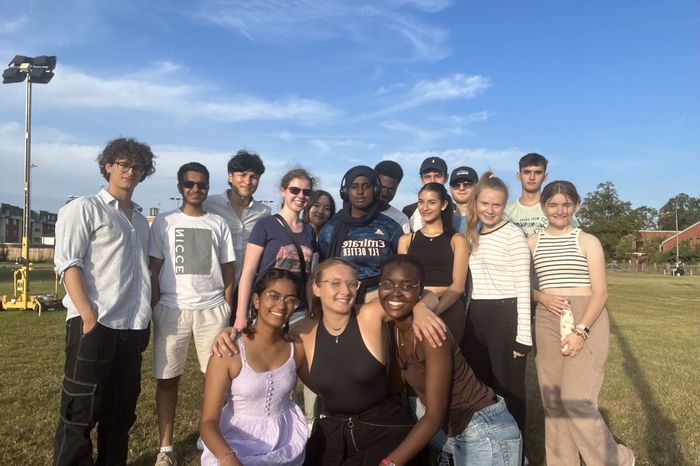Cambridge’s outreach departments deserve some love
Evie McMahon argues that college access and outreach departments and their student-led initiatives are the backbone of progressing accessibility at Cambridge

At a university that scrutinises term-time employment, I, like many others, turned to the illustrious world of student ambassador work as soon as I got the chance. In truth, I have always enjoyed the idea of mentoring prospective students and giving them personal advice about the admissions process that Google neglects to yield. Not to mention the benefits of getting paid and given free food, transport, and accommodation. Working with the access and outreach department, the access and class act student officers, and fellow student ambassadors has shown me just how pivotal these college-based and student-run systems are for those applying to Cambridge, and just how underappreciated they may be.
“The true driving force behind many of the widening participation successes at Cambridge are the college access departments and the students that they employ”
The recent interview period once again proved to me that the true driving force behind many of the widening participation successes at Cambridge are the college access departments and the students that they employ. News outlets and the university itself broadcast and mention the efforts of wider university administration often, trying to push the notion that Cambridge is becoming an increasingly accessible institution. Initiatives like the University of Cambridge scrapping its state school targets last year or the Vice Chancellor’s trip to the North-West of England are more commonly known about. This often feels ironic coming from a university endorsing fee hikes which may discourage students from lower-income backgrounds. Comparatively, less attention is directed towards the initiatives led by access departments and students at the university which arguably have a greater positive impact on the admissions cycle.
My own experience on an ‘Access Bus’ organised by the access Officer of my college’s JCR exemplified how pivotal these initiatives are. Our team of four students spent multiple days in the Bedfordshire area, travelling widely across the county to deliver presentations and advice sessions to state schoolers. What struck me most was how many of the students we talked to came to tell us afterwards we had encouraged them to apply, when they had not been considering it seriously beforehand.
Delivering these talks and engaging with these students took me back to my own experience of applying to Cambridge from a state school in the north-west. Trying to prepare for my Cambridge application had some challenges, as my school had never sent more than two people a year to Oxbridge. But, these talks from Cambridge students themselves gave me the confidence and advice I needed to tackle such an elusive process.
“It is really another thing to talk to a student themselves, who may have a similar background, and hear what they have to say”
A vital process of advice-giving and mentoring is carried out on a smaller scale via student ambassadors on interview days, open days, and school tours. It is one thing to be told by a large institution that you should apply, no matter where you are from, but it is really another thing to talk to a student themselves, who may have a similar background, and hear what they have to say.

I want to know how you got out': the power of access and outreach work for social mobility
Many of the Cambridge colleges now have social media platforms dedicated to their access and outreach departments. Who knew TikToks could be so beneficial to a prospective student? Pembroke hosts @pemcamoutreach and Gonville and Caius run @caiusschools. Many of these accounts have racked up a fair number of followers and views. Their videos answer the burning questions that many have, especially those coming from a background far removed from Oxbridge association. They give interview tips, application information, and invite students to give Q&As. If I were a student applying now, my screen time would definitely be taken up by these accounts. This crucial online presence is made tangible through events like the ‘Access Bus’ and do wonders for breaking down the barriers that prevent state-schoolers from applying to Cambridge.
The initiatives of access and outreach departments always have current and prospective students at their centre. In future, I hope they receive the credit they deserve and the increased funding they need to break down the barriers the university itself fails to.
Want to share your thoughts on this article? Send us a letter to letters@varsity.co.uk or by using this form.
 Interviews / You don’t need to peak at Cambridge, says Robin Harding31 December 2025
Interviews / You don’t need to peak at Cambridge, says Robin Harding31 December 2025 News / Cambridge academics stand out in King’s 2026 Honours List2 January 2026
News / Cambridge academics stand out in King’s 2026 Honours List2 January 2026 Comment / What happened to men at Cambridge?31 December 2025
Comment / What happened to men at Cambridge?31 December 2025 News / Unions protest handling of redundancies at Epidemiology Unit30 December 2025
News / Unions protest handling of redundancies at Epidemiology Unit30 December 2025 News / Varsity’s biggest stories of 202531 December 2025
News / Varsity’s biggest stories of 202531 December 2025









